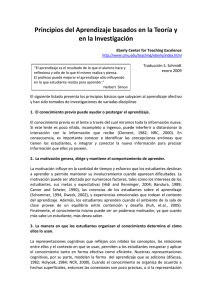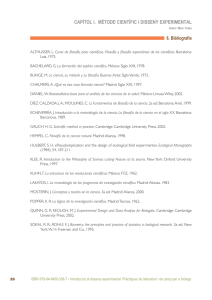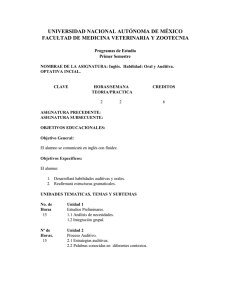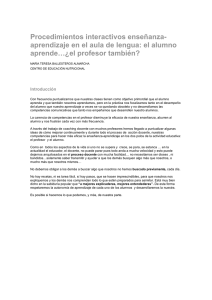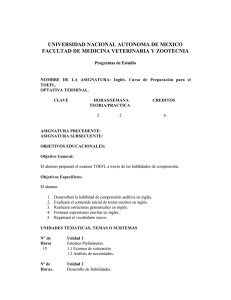Departamento de Psicología Básica II (Procesos Cognitivos
Anuncio
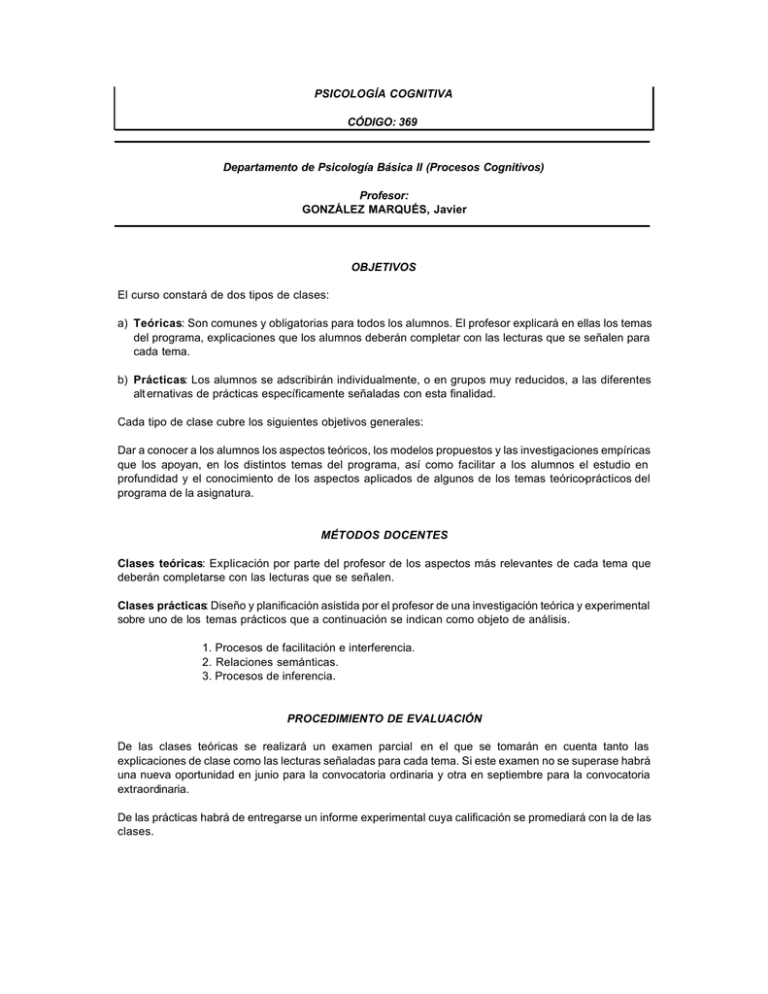
PSICOLOGÍA COGNITIVA CÓDIGO: 369 Departamento de Psicología Básica II (Procesos Cognitivos) Profesor: GONZÁLEZ MARQUÉS, Javier OBJETIVOS El curso constará de dos tipos de clases: a) Teóricas: Son comunes y obligatorias para todos los alumnos. El profesor explicará en ellas los temas del programa, explicaciones que los alumnos deberán completar con las lecturas que se señalen para cada tema. b) Prácticas: Los alumnos se adscribirán individualmente, o en grupos muy reducidos, a las diferentes alt ernativas de prácticas específicamente señaladas con esta finalidad. Cada tipo de clase cubre los siguientes objetivos generales: Dar a conocer a los alumnos los aspectos teóricos, los modelos propuestos y las investigaciones empíricas que los apoyan, en los distintos temas del programa, así como facilitar a los alumnos el estudio en profundidad y el conocimiento de los aspectos aplicados de algunos de los temas teórico-prácticos del programa de la asignatura. MÉTODOS DOCENTES Clases teóricas: Explicación por parte del profesor de los aspectos más relevantes de cada tema que deberán completarse con las lecturas que se señalen. Clases prácticas: Diseño y planificación asistida por el profesor de una investigación teórica y experimental sobre uno de los temas prácticos que a continuación se indican como objeto de análisis. 1. Procesos de facilitación e interferencia. 2. Relaciones semánticas. 3. Procesos de inferencia. PROCEDIMIENTO DE EVALUACIÓN De las clases teóricas se realizará un examen parcial en el que se tomarán en cuenta tanto las explicaciones de clase como las lecturas señaladas para cada tema. Si este examen no se superase habrá una nueva oportunidad en junio para la convocatoria ordinaria y otra en septiembre para la convocatoria extraordinaria. De las prácticas habrá de entregarse un informe experimental cuya calificación se promediará con la de las clases. Psicología Cognitiva 369 PROGRAMA 1. Concepto de psicología cognitiva 2. La arquitectura del sistema cognitivo humano 3. La actividad cognitiva 4. La actividad metacognitiva 5. Procesos de facilitación e interferencia 6. Aplicaciones de la psicología cognitiva BIBLIOGRAFÍA AITKENHEAD, A. M. y SLACK, J. M. (1.985). Issues in cognitive modeling. Hillsdale (NJ): Lawrence Erlbaum Associates. ANDERSON, J. R. (1.990). Cognitive psychology and its implications (3 edición revisada). San Francisco: Freeman. ANDERSON, J. R. (1.993). Rules of the mind. Hillsdale (NJ): Lawrence Erlbaum Associates. ASHCRAFT, M. H. (1.989). Human memory and cognition. Glenview (IL): Scott, Foereman and Co. ASTINGTON, W., HARRIS, P. L. y OLSON, D. R. (1.988). Developing theories of mind. Cambridge: Cambridge University Press. BAARS, B. J. (1.986). The cognitive revolution in psychology. Nueva York: The Guilford Press. BARSALOU, L. W. (1.992). Cognitive psychology: An overview for cognitive scientists. Hillsdale (NJ): Lawrence Erlbaum Associates. BODEN, M. A. (1.988). Computer models of mind. Chichester: John Wiley and Sons. BODEN, M. A. (1.989). Artificial intelligence in psychology: Interdisciplinary essays . Cambridge (MA): The MIT Press. CHI, M. T. H., GLASER, R. y FARR, M. J. (eds.) (1.988). The nature of expertise. Hillsdale (NJ): Lawrence Erlbaum Associates. CLAXTON, G. (1.988). Grwth points in cognition. Londres: Routledge. DENIS, M., ENGELKAMP, J. y RICHARDSON, J. T. E. (1.988). Cognitive and neuropsychological approaches to mental imagery. Dordrecht: Martinus Nijhoff. DUSCHL, R. A. y HAMILTON, R. J. (1.992). Philosophy of science, cognitive psychology and educational theory and practice. Albany (NY): State University of New York Press. ESTES, W. K. (1.994). Classification and cognition. Nueva York: Oxford University Press. EYSENCK, M. W., ELLIS, A. W., HUNT, E. B. y JOHNSON-LAIRD, P. N. (eds.). (1.994). The Blackwell dictionary in cognitive psychology. Oxford: Basil Blackwell. EYSENCK, M. W. y KEANE, M. T. (1.990). Cognitive psychology: A student's handbook. Hillsdale (NJ): Lawrence Erlbaum Associates. FODOR, J. (1.986). La modularidad de la mente. Madrid: Morata. FODOR, J. (1.987). Psychosemantics: The problem of meaningin the philosophy of mind. Cambridge (MA): The MIT Press. FREDERIKSEN, N., GLASER, R., LESGOLD, A. y SHAFTO, M. G. (eds.) (1.990). Diagnostic monitoring of skill and knowledge acquisition. Hillsdale (NJ): Lawrence Erlbaum Associates. FREEMAN, A., SIMON, K. M., BEUTLER, L. E. y ARKOWITZ, H. (eds.) (1.989). Comprehensive handbook of cognitive therapy. Nueva York: Plenum Press. GARDNER, H. (1.987). La nueva ciencia de la mente. Barcelona: Paidos. GARFIELD, J. L. (ed.) (1.987). Modularity in knowledge representation and natural-language understanding. Cambridge (MA): The MIT Press. GARNHAM, A. (1.987). Mental models as representations of discourse and text. Chichester: Ellis Harwood. GARNHAM, A. y OAKHILL, J. (1.994). Thinking and reasoning. Oxford: Basil Blackwell. GELMAN, S. A. y BYRNES, J. P. (1.991). Perspectives on language and thought: Interrelations in development. Cambridge: Cambridge University Press. GLASER, R. (1.991). Intelligence as an expression of acquired knowledge. Hillsdale (NJ): Lawrence Erlbaum Associates. 369 Psicología Cognitiva GREENWOOD, J. D. (ed.) (1.991). The future of folk psychology: Intentionality and cognitive science. Cambridge: Cambridge University Press. HABERLANT, K. (1.994). Cognitive psychology. Needham Heights (MA): Allyn and Bacon. HEDLEY, C. N., HOUTZ, J. y BARATTA, A. (eds.) (1.990). Cognition, curriculum and literacy. Norwood (NJ): Ablex Publishing Corp. JACKENDOFF; R. S. (1.987). Conciousness and the computational mind. Cambridge (MA): The MIT Press. JACKENDOFF, R. S. (1.992). Languages of the mind: Essays on mental representation. Cambridge (MA): The MIT Press. JOHNSON-LAIRD, P. N. (1.983). Mental models. Cambridge: Cambridge University Press. JOHNSON-LAIRD, P. N. (1.990). El ordenador y la mente. Barcelona: Paidos. KAHNEMAN, D., SLOVIC, P Y TVERSKY, A. (1.982). Judgement under uncertainty: heuristics and biases . Cambridge: Cambridge University Press. KARMILOFF-SMITH, A. (1.992). Beyond modularity: A developmental perspective on cognitive science. Cambridge (MA): The MIT Press. KEMPSON, R. M. (1.988). Mental representations. Cambridge: Cambridge University Press. KESSEN, W., ORTONY, A. y CRIK, F. I. M. (1.991). Memories, thoughts and emotions: Essays in honor of George Mandler. Hillsdale (NJ): Lawrence Erlbaum Associates. KOSSLYN, S. M. (1.994). Image and brain: The resolution of the imagery debate. Cambridge (MA): The MIT Press. LEGG, S. y ALGINA, J. (eds.) (1.990). Cognitive assessment of language and math outcomes. Norwood (NJ): Ablex Publishing Corp. LOGIE, R. H. y DENIS, M. (1.991). Mental images in human cognition. Amsterdam: North Holland. MANKTELOW, K. I. y OVER, D. E. (1.990). Inference and understanding: A philosophical and psychological perspective. Londres: Routledge and Kegan Paul. MANKTELOW, K. I. y OVER, D. E. (1.993). Rationality: Psychological and psychological perspectives. Londres: Routledge and Kegan Paul. MAYER, R. (1.985). El futuro de la psicología cognitiva. Madrid: Alianza MAYOR, J. (ed.) (1.985). Actividad humana y procesos cognitivos. Madrid: Alhambra McCLELLAND, J. L., RUMELHART, D. E. & THE PDP RESEARCH GROUP (1.986). Parallel distributed processing. Cambridge (MA): The MIT Press. McGILLY, K. (ed.) (1.994). Classroom lessons: Integrating cognitive theory and classroom practice. Cambridge (MA): The MIT Press. MEYER, D. E. y KORNBLUM, S. (eds.) (1.993). Attention and performance 14: Synergies in experimental psychology, artificial intelligence and cognitive neuroscience. Cambridge (MA): The MIT Press. MORRIS, P. (1.987). Modelling cognition. Chichester: John Wiley and Sons. MURRE, J. M. J. (1.992). Learning annd categorization in modular neural networks. Hillsdale (NJ): Lawrence Erlbaum Associates. NISBETT, R. E. (ed.) (1.993). Rules for reasoning. Hillsdale (NJ): Lawrence Erlbaum Associates. NORMAN, D. A. (1.987). Perspectivas en ciencia cognitiva. Barcelona: Paidos. PAIVIO, A. (1.991). Images in mind: The evolution of a theory. Nueva York: Harvester Wheatsheaf. PENNER, L. A., BATSCHE, G. M., KNOFF, H. M. y NELSON, D. L. (eds.) (1.993). The challenge in mathematics and science education: Psychology's response. Washington (DC): America Psychological Association. PERNER, J. (1.991). Understanding the representational mind. Cambridge (MA): The MIT Press. PICK, H. L. Jr, van den Broek, P. W. y Knill, D. C. (eds). Cognition. Washington (DC): America Psychological Association. PRATT, C. y GARTON, A. F. (eds.) (1.993). Systems of representation in children: Development and use. Chichester: John Wiley and Sons. PUCKETT, J. N. y REESE, H. W. (1.993). Mechanisms of everiday cognition. Hillsdale (NJ): Lawrence Erlbaum Associates. ROLLINS, M. (1.989). Mental imagery: On the limits of cognitive science. New Haven (CT): Yale University Press. SANDFORD, A. J. (1.985). Cognition and cognitive psychology. Londres: Weindenfeld and Nicholson. SHANTEAU, J. (1.992). The psychology of experts: An alternative view. Nueva York: Plenum Press. Psicología Cognitiva 369 STEVENSON, R. J. (1.993). Language, thought and representation. Chichester: John Wiley and Sons. TYE, M. (1.991). The imagery debate. Cambridge (MA): The MIT Press. Van MECHELEN, I., HAMPTON, J., MICHALSKI, R. S. y THEUNS, P. (eds.) (1.993). Categories and concepts: Theoretical views and inductive data analysis . San Diego (CA): Academic Press.
